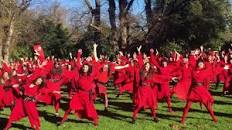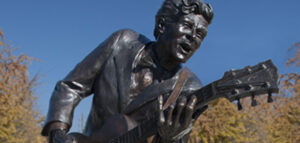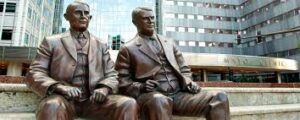
One thing I seem to have missed as I have aged is the music revolution. Last week in Melbourne there were all these people in red dancing around in a park – something to do with Kate Bush, in red, outside a window singing about “Wuthering Heights”. My appreciation of music is limited by the fact that in its creation, playing and singing I am completely talentless. However, I understand that there is a very popular band called Pale Waves, an Indie-band with a lead singer called Heather who has one of the voices that would divide a mosh pit like the Red Sea. They sing:
I was eighteen when I met you
Poured my heart out, spilt all my truth
I finally felt like I could feel for the first time
When I met you.
The video is dark and moody with more than a hint of sex but with all the “on the road” clichés pasted along its way.
Now my era danced to Chuck Berry’s “Sweet little Sixteen” – bit of poetic licence in the age difference, but it is all about being young, which is the root of nostalgia. The Beach Boys pinched the tune for “Surfin’ USA”.
Sweet Little Sixteen
She’s just got to have
About half a million
Framed autographs
Her wallet’s filled with pictures
She gets ’em one by one
She gets so excited
Watch her look at her run
Berry was a genius. The singer from Indie Pop group, Pale Waves may turn out to be one as well. I saw Chuck Berry perform in the twilight of his career in a basement in St Louis. We were the ageing mosh pit; it was one of our most memorable experiences.

I missed the Pale Waves when they were here in 2018, but perhaps they will roll in again.
Fanfare for the Common Man
I am not an American citizen, however for what it is worth, I have an alternative view of the USA to that of its President.
I have friends in Lubec, on the Canadian border in Maine. Across the water in Canada is Campobello Island, which is synonymous with Franklin Delano Roosevelt. Roosevelt smiled; he exuded optimism. He was also a cripple, struck down by the poliovirus one morning on this most beautiful of islands. Yet he strove for his own independence and courage.
I come from a country where to bare arms is to get down to work with my fellow citizens. I have never seen a gun except sleeping in a rack. Maybe I am careful, but the myths of the NRA are powerful, like those of Washington Irving. The story goes … it’s the guns that kill, not people. Guns must therefore awake, get off the rack, stretch their barrels, and discharge a thousand bullets before breakfast. People are killed but guns remain the same.
I live a country where there is no gun culture comparable to that of the United States and yet our major commemoration is a World War One disaster at Gallipoli and our national day is called by some “Invasion Day,” when Great Britain dumped a bunch of their unwanted – convicts and marines – in a desolate place called Botany Bay in 1788. Despite its apparent vigour, this is a country rooted in pessimism.
America’s national day celebrates something more than putting a British foot on a distant shore.
Australia has a dirge for a national anthem. America’s anthem was forged as the smoke from the British bombardment of Fort McHenry cleared in 1814 and the American flag was still flying. Francis Scott Key was inspired to write the words of “The Star-Spangled Banner.” Today Fort McHenry is one of only two places in the United States where the 1814 fifteen-star flag still flies. The other is at the end of the Oregon Trail.
I love my country. I have travelled all over my own country.
But then I have also been privileged to roam the United States too. I have sponsored musk oxen called Amethyst and Pixie Stix in that Folly, Alaska. I have sat in the San Franciscan courtyard and then written about the early days and aspirations of Genentech before Silicon Valley arrived to crush the city. I have eaten king salmon in Salem, Oregon, and crab in Sabine Pass, Texas – both sublime experiences. I have stood at the doors of that miracle of Minnesota, the Mayo Clinic. I have gazed at Mount Rushmore and know now why those four presidents were carved. I have wept at Shiloh. I have stood in the wheel ruts of the Oregon Trail in Douglas, Wyoming. I have joined in a march to the Tenderloin on January 15. And so on … identifying something extraordinary in all the 50 States I have visited, not to mention Puerto Rico.
However, I am white and while there was a certain exhilaration of being part of a January 15 homage to the life of Martin Luther King, I have had another far different experience of turning a corner in the national capital from a gentrified brown stone street, to find that I seemed to be the only white person in the street. Not even an Officer Krupke. I did not turn; I walked briskly making no eye contact yet experienced the tension of being alone in a very foreign country, well outside my comfort zone. I walked the block, before turning into another zone of brownstone gentrification.
I have money; I do not have to panhandle; I have a bed to go to every night. I do not have a child in a cage on the Mexican border. I know where my children and, for that matter, my grand children are.
Now, my luggage did vanish forever at Los Angeles Airport. I still had money and passport, but trying to find a suit of clothes in downtown Washington was a challenge. In the end a modified “zoot suit” made me feel very foreign.
Only once have I had to use the American health system. I quarantine myself by taking out very expensive travel insurance. I am able to do so. My actual experience with the health system came one day after I had run in the Annual Bay to Breakers fun run in San Francisco, a novel way to see that city. I developed a dental abscess, but as I had to fly to Orlando taking a day to get there with only aspirin and bicillin which did nothing. Hence when I arrived late into Orlando, I experienced probably my worst night in pain. I sat up all night watching the wrestling on TV and in the morning the organiser of the conference, seeing that I had a face the shape of an angry balloon, took me to an endodontist who immediately drained the abscess without requiring me losing any teeth. I had immediate relief from the pain.
The United States in all its diversity, both good and bad, has been my energiser from the first time I went there. But I am and have been a privileged observer able to see the sights and yet travelling around its less well-known parts without a gun being poked in my face.
Even in adversity, America has always exuded optimism, and on my latest visit it was no different. But that was almost two years ago.
Make America great again!
What crap!
America remains Great despite all its warts. The only problem is that the USA has a President who wants to make America Hate.
He wants Americans to lose their Smile, to lose their Optimism; to lose the meaning of the fourth of July.
Such a pity!
Twenty years has passed
Let me start with a quote:
“… there is no substitute for a careful and painstaking history and a meticulous physical examination. This is the cornerstone of medical practice…”
This came from a 1977 article by Lou Ariotti – it is clear; it is not infested with jargon. It says it all. It is applicable across all health practice.
Lou Ariotti was the real deal in Charleville for many years and some of what he did with limited resources was remarkable. Initially, there were no beds in the hospital. So he taught the families how to look after the sick in the home, taught them simple procedures. There were inadequate facilities at the hospital; so he set up the forerunner of the day surgery in his premises.
However, very tellingly he stated that he got his inspiration from the Mayo Brothers who trekked out from Chicago as young medical graduates into the Minnesota wilderness – and today we have the Mayo Clinic.

What the Mayos demonstrated was that you can move intellectual capital to remote areas, but you have to have succession planning. As I have said many times, the doctor in the bush faces inter alia social dislocation and professional isolation.
Yet that world of the Mayo Brothers and Lou Ariotti was the world of the individual. The difference between the Mayos and Lou was that the Mayos left a legacy and Lou Ariotti a memory. Lou made sure the Queensland Premier provided him with a large hospital, but as you know monuments are just that. He may have admired the Mayo Brothers, and while he left an adequate health service – his legacy was the memory of himself, the man rather than memory of Charleville itself being a centre of medical excellence.
After all, we are still digging up parts of the ruins of ancient Roman monuments, but the Vatican on the same site as Ancient Rome has learned the trick about matching monument retention to succession planning.
This was written last year for the commemoration of the first 20 years of the Mount Isa University Department of Rural Health, part of the successful endeavour to move the education of medical and other allied professionals to universities of rural health and rural clinical schools. In my last blog, I questioned the glacial progress of the review of the MBS. Having been closely involved in the introduction of the rural clinical schools, it is disappointing to read that the Rural Health Commissioner, in a recent article, can only conclude by saying “a nationalist rural generalist pathway is good for rural communities” Appointed two years ago in 2017, it has taken him two years to say that! Oh, I forget, there are the inevitable diagrams.
But at least he will have a huge number of happy snaps to remember where he went over the past two years as the rural Bill Peach.
Seriously are these reviews going anywhere? Now there is talk of the Health Minister ordering a heath of private health insurance review. Hopefully, Minister, the deadline will be somewhat tighter than the ongoing ones. Show the community how they are influencing health policy or are they just an elaborate way of doing nothing while re-arranging the flowerpots on the window sill?
Mouse Whisper
I remember when the song “Diana” was released in 1957, and the sensational fact at the time was that Paul Anka was the 15 year old song writer as well as the singer.
The story goes that Diana was an older kid who used to look after Paul when he was a child. Paul had a kiddy-crush on her with less than enthusiastic response on her part. There was about a three-year difference. Years later, after the song went to Numero Uno on the charts and he was a star, she suddenly showed up saying, “Take me! I’m yours!” to which he gently replied, “Sorry, our time is past.”
But she still had Diana!
